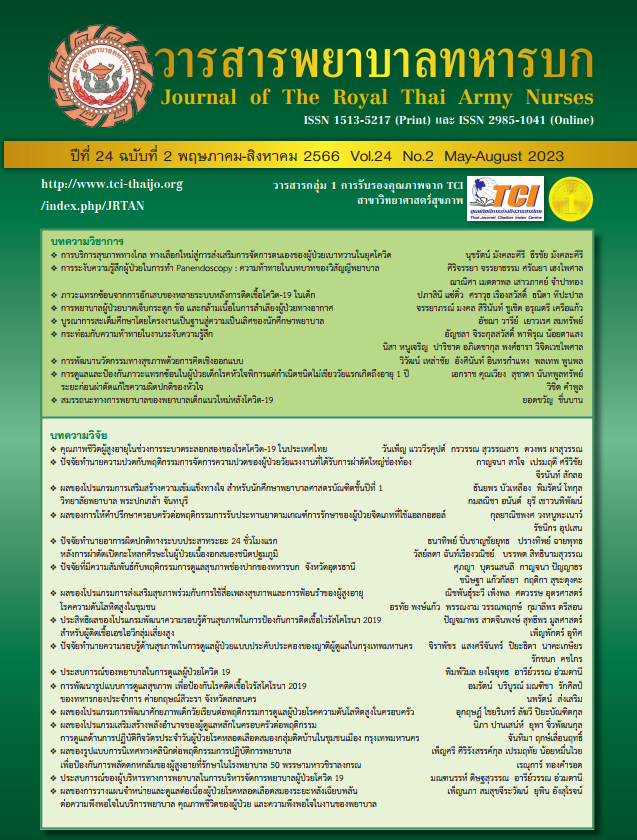Factors Predicting Postpartum Depression among Cesarean Section Mothers with Sick Newborns
Keywords:
postpartum depression, cesarean section mothers, sick newbornsAbstract
The present study adopted a predictive correlational research design with the aim of investigating the predictability of postpartum depression among cesarean section mothers with sick newborns. The samples were 123 cases at a public hospital in Nakhon Phanom Province. This study was carried out during the period of May 2022 – February 2023. The research instruments were a demographic and obstetrics questionnaire, a childbirth experience questionnaire, a postpartum social support questionnaire, a parenting stress questionnaire, and a postpartum depression questionnaire. The collected data were analyzed by multiple regression.
The results indicated that mothers’ age, family income, childbirth experience, the length of infants’ treatment at the sick newborn care unit, social support, and parenting stress could predict 62.20 percent of postpartum depression among the cesarean section mothers with sick newborns (Adjust R2 = .60, F = 31.80, p < .001). The most significant predictive factor was parenting stress (ß = .23, p < .001).
Downloads
References
Josi R. Caesarean section epidemic: Tackling the rise of unnecessary cuts. European Journal of Midwifery. 2019;3:1-2.
Tienmontree K, Chunuan S, Kala S. Factors Influencing Decision-Making for Cesarean Section among Primigravidae. Nursing Journal of the Ministry of Public Health. 2020;31(1): 96-109. (in Thai)
Pinchaleaw D, Bhoosahas P. Factors Related to Women’s Distress after Cesarean Section. Journal of The Royal Thai Army Nurses. 2016;16(1):101-8. (in Thai)
Carquillat P, Boulvain M, Guittier MJ. How does delivery method influence factors that contribute to women’s childbirth experiences?. Midwifery. 2016;(43):21-8.
Benton M, Salter A, Tape N, Wilkinson C, Turnbull D. Women’s psychosocial outcomes following an emergency caesarean section: A systematic literature review. BMC Pregnancy Childbirth. 2019;19(1):535.
Raksapakdee R, Srisaeng P, Ungpansattawong S. The relationships of selected factors and postpartum depression among postpartum mothers with hospitalized preterm infants. Journal of Nursing Science & Health. 2018; 41(1):1-11. (in Thai)
Brownlee MH. Screening for Postpartum Depression in a Neonatal Intensive Care Unit. Advances in neonatal care. 2022;22(3):102-10.
Cox JL, Holden JM, Sagovsky R. Detection of postnatal depression: Development of the 10 item Edinburgh Postnatal Depression Scale. The British Journal of Psychiatry. 1987;150: 782-86.
Kittichotiwat W. Prevalence and Associated Factors of Postpartum Depression in Kaengkhoi Hospital, Saraburi Province. Journal of the Department of Medical Services. 2018; 43(5):125–30. (in Thai)
NuanChawi W, Kasiphon T, Nathithanasombat K. The prevalence of postpartum depression and factors predicting depression in postpartum mothers. HCU Journal. 2018;21(42):65-78. (in Thai)
Saenbunma K, Deoisres W, Chuahom U. Predictors of Postpartum Depression Among Women with Emergency Cesarean Section. The Journal of Faculty of Nursing Burapha University. 2019;27(3):23-31. (in Thai)
Sarah SB, Forozan SP, Leila D. The relationship between model of delivery and postpartum depression. The Annals of Tropical Medicine and Public Health. 2017;10(4):874-77.
Lowdermilk DL, Perry SE, Cashion MC, Alden KR. Maternity and women’s health care. 12th ed. St. Louis: Elsevier; 2020.
Alexandroaia C, Sima RM, Balalau OD, Olaru GO, Ples L. Patients’ perception of childbirth according to the delivery method: The experience in our clinic. Journal of Mind and Medical Sciences. 2019;6(2):311-18.
Suriyanimitsuk T, Deoiseres W, Wongnum P, Williams PD. A causal model of late postpartum depression and its effects on maternal roles. Journal of Health Science Research. 2015;9(1):16-25. (in Thai)
Marut JS, Mercer RT. Comparison of primiparas’ perceptions of vaginal and cesarean births. Nursing Research. 1979;28(5):260-65.
House JS. Work stress and social support. MA: Addison-Wesley; 1981.
Cohen J. Multiple regression and correlation analysis. In: Cohen J, editor. Statistical power analysis for the behavioral sciences. 2nd ed. New Jersey: Lawrence Erlbaum Associates; 1988.
Sanitlou N, Sartphet W, Naphaarrak Y. Sample Size Calculation using G*Power program. Journal of Suvarnabhumi Institute of Technology. 2019;5(1):497-507. (in Thai)
Saeliw P, Kantaruks K, Chaloumsuk N. Perceptions of Childbirth Experience, Social Support and Maternal Role Attainment among Mothers with Cesarean Section. Nursing Journal. 2015;42 (Suppl):69-81. (in Thai)
Parisunyakul S, Baosoung C, Prasitwatanasaree P. Predictors of Women’s Perceptions of the Positive Childbirth Experience. Nursing Journal. 2013;40(1):84-93. (in Thai)
Sitthiboonma N, Kantaruksa K, Supavititpatana B. Stress, Social Support and Postpartum Depression Among First-time Mothers. Nursing Journal. 2015;47(2):169-79. (in Thai)
Pitanupong J, Liabsuetrakul T, Vittayanont A. Validation of the Thai Edinburgh Postnatal Depression Scale for screening postpartum depression. Psychiatry Research. 2007;149 (1-3):253-59.
Pattanasombutsook M. Validation of Nursing Research Reports and Proper Use of Social Science Research Instruments in Publishing. Journal of Nursing and Public Health. 2020; 8(2):189-204. (in Thai)
Aree P, Chitpakdee B, editors. Statistics for Nursing Research. Chiang Mai: Faculty of Nursing Chiang Mai University; 2014. (in Thai)
Pumek S, Kovavisarach E, Keanoppakun M, Sangpitak W. Factors Predicting Depression of Postpartum Mother in Rajavithi Hospital. Journal of Health and Nursing Research. 2019;35(3):158-68. (in Thai)
Sukasem N, Ruangphornwisut R, Sriareporn P, Siririth W, Watcharaprapapong P. Predictors of Postpartum Depression. Journal of Nursing and Health Care. 2016;34(1):47-55. (in Thai)
Eckerdal P, Georgakis KM, Kollia N, Wikstrom A, Hogberg U, Skalkidou A. Delineating the association between mode of delivery and postpartum depression symptoms: a longitudinal study. Acta Obstetricia et Gynecologica Scandinavica. 2018;97(3):301–11.
Cherry AS, Blucker RT, Thornberry TS, Hetherington C, McCaffree MA, Gillaspy SR. Postpartum depression screening in the Neonatal Intensive Care Unit: program development, implementation, and lessons learned. Journal of Multidisciplinary Healthcare. 2016;(9):59–67.
Pukdeesamai A, Sriarporn P, Xuto P. Factors Predicting Postpartum Depression Among First-time Mothers. Nursing Journal. 2017; 44(3):19-29. (in Thai)
Anusornteerakul S, Harnklar S, Ounkaew A, Chaiwan W, Boonmala N. Mental Health and Adaptation among Postpartum Mothers. Journal of The Royal Thai Army Nurses. 2023;24(1):116-24. (in Thai)
Downloads
Published
How to Cite
Issue
Section
License
Copyright (c) 2023 Journal of The Royal Thai Army Nurses

This work is licensed under a Creative Commons Attribution-NonCommercial-NoDerivatives 4.0 International License.
บทความหรือข้อคิดเห็นใดใดที่ปรากฏในวารสารพยาบาลทหารบกเป็นวรรณกรรมของผู้เขียน ซึ่งบรรณาธิการหรือสมาคมพยาบาลทหารบก ไม่จำเป็นต้องเห็นด้วย
บทความที่ได้รับการตีพิมพ์เป็นลิขสิทธิ์ของวารสารพยาบาลทหารบก
The ideas and opinions expressed in the Journal of The Royal Thai Army Nurses are those of the authors and not necessarily those
of the editor or Royal Thai Army Nurses Association.






